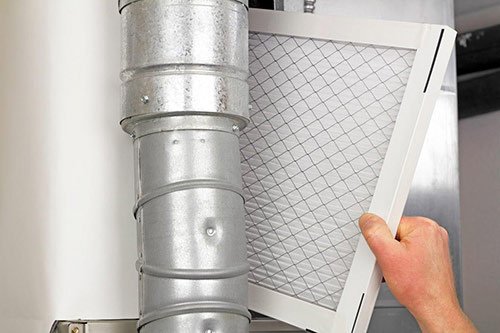Heating and cooling emergencies happen when you least expect them. The experts at C.B. Lucas will assess and handle any emergency HVAC or plumbing issues in your home or business. We have the necessary skills and tools to fix your system so you can safely use it once again. Call C.B. Lucas to get 24/7 emergency HVAC & plumbing services in Northern Virginia and the surrounding areas.
What to Know About MERV and Your HVAC System
Changing your HVAC system’s air filter is something you’ll need to take care of sooner or later. However, changing a filter isn’t quite as simple as swapping your old filter out for a new one. There’s a lot that goes into designing and manufacturing an air filter. After all, it plays an integral role in keeping the indoor air you breathe free of harmful airborne particles.
With so many different types of air filters to choose from, picking one that offers the best overall performance can be a bit tricky. This is where MERV comes in. MERV is a way you can compare air filters in order to find the one that meets your home’s filtration needs.
What Is MERV?
MERV is actually an acronym that stands for “Minimum Efficiency Reporting Value.” MERV is a set of testing standards that determine how well air filters perform at capturing dust, pollen and a variety of other airborne pollutants ranging from cigarette smoke to bacteria and viruses.
In essence, MERV is a handy comparison tool you can use to determine which air filter is likely to perform best in your HVAC system. Although MERV is the leading standard for the majority of air filter manufacturers, some retailers use their own custom rating systems to rate air filters sold in their stores. Keep in mind that these systems might not be compatible with MERV.
How Does MERV Work?
HVAC air filters that use the MERV standard undergo several tests covering airborne particles as large as 10 microns to particles as small as 0.30 microns. Each test uses a particle generator that sends synthetic dust particles of a specific size through the air filter. Testers then compare particle counts upstream of the filter with those measured downstream of it.
A typical air filter goes through six passes, starting with a clean filter. Each successive pass allows the filter to become progressively dirtier, allowing testers to simulate performance under normal use. To ensure that each filter is accurately tested, the testing equipment must undergo 13 qualification tests to ensure both accurate calibration and standardization under laboratory conditions.
After all of this thorough testing, the filter is given a value and you can use this value to compare one air filter’s overall performance to another. These values are based on a scale of 1 to 16 for most standard HVAC air filters.
What Does MERV Mean for Your HVAC System?
Think of MERV as a quick way to compare several HVAC air filters at once. Instead of pouring over arcane test results for hours in search of the best air filter, you can quickly narrow down your search results and even focus on other factors like price and build quality.
If you plan on upgrading your current air filter, its MERV should give you an idea of where it lies performance-wise and how far you should upgrade to improve your home’s indoor air quality. If your current air filter is rated at a MERV of 3, upgrading to one rated at a MERV of 7 or higher can significantly improve your air quality as well as your HVAC system’s overall performance.
However, a high MERV doesn’t necessarily guarantee superior performance for an air filter. The MERV rating tells you which particles are filtered and helps the customer decided which particles they want to be filtered out. Some filters offer increased filtration performance at the expense of airflow. An air filter that’s too constrictive for its HVAC system can suffer increased wear and other mechanical issues throughout its working life.
Common Ratings for HVAC Air Filters
The material of the air filter can affect its rating. Most fiberglass HVAC air filters and the majority of washable air filters are rated at a MERV of 3 or 4. These filters can block large dust and debris particles, but their pores are usually too large to capture anything smaller. Pleated paper filters feature smaller pores in comparison, giving them better filtration performance and a higher MERV ranging from 5 to 8.
Pleated air filters rated at a MERV of 9 through 12 offer better performance, capturing up to 90 percent of particles as small as 1 micron. These filters aren’t just capable of trapping mold spores and volatile organic compounds or VOCs – they can also trap Legionella droplets. Filters rated between a MERV of 13 and 16 go a step further by trapping bacteria droplets and other harmful particles as small as 0.3 microns.
There are HVAC air filters that can go above and beyond the MERV scale. These include HEPA filters intended for use in medical and industrial settings. Despite being exceptionally effective at capturing virus droplets and other harmful airborne particles, these filters can prove heavily restrictive in most residential HVAC units unless they’re significantly modified to overcome airflow constraints.
MERV can be a tremendous help when it comes to finding the right air filter for your HVAC system. If you have any more questions, the experts at C.B. Lucas Heating & Air Conditioning are always there to help, give us a call today.
A garbage disposal is a convenient and eco-friendly way to handle food waste in your Northern Virginia kitchen. Placing food scraps in the garbage can...


